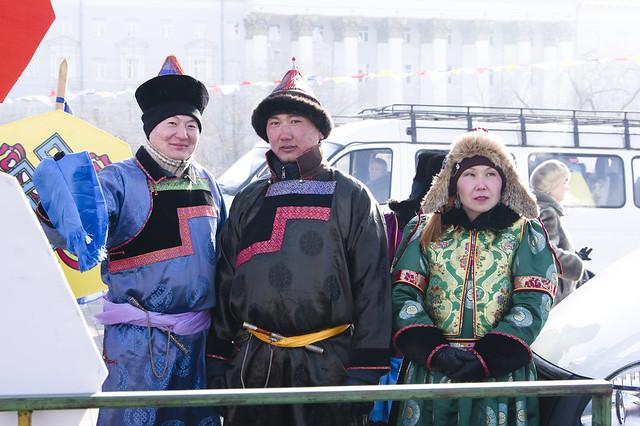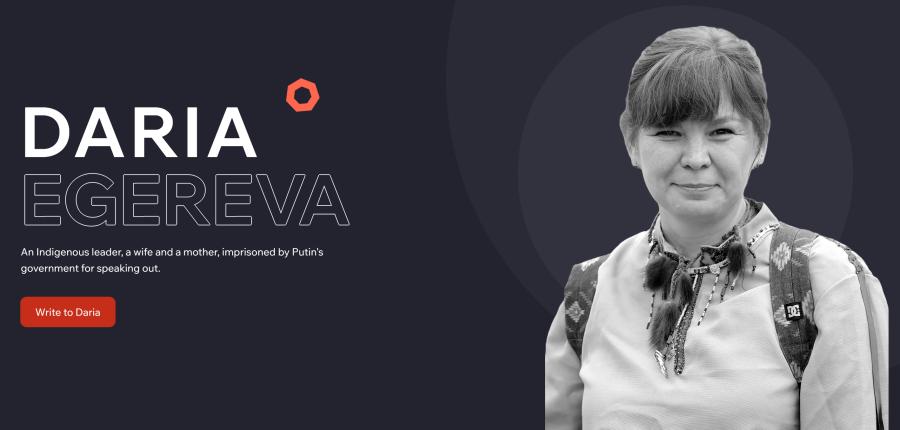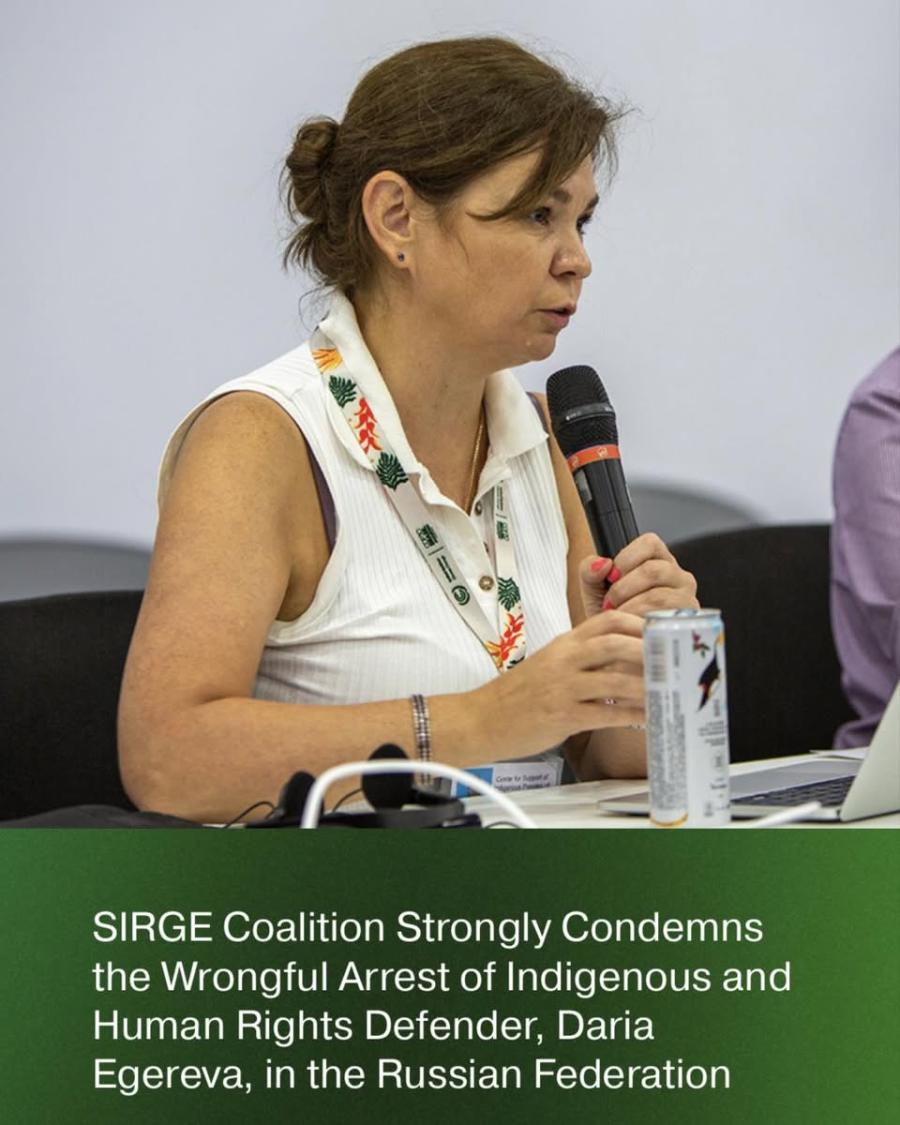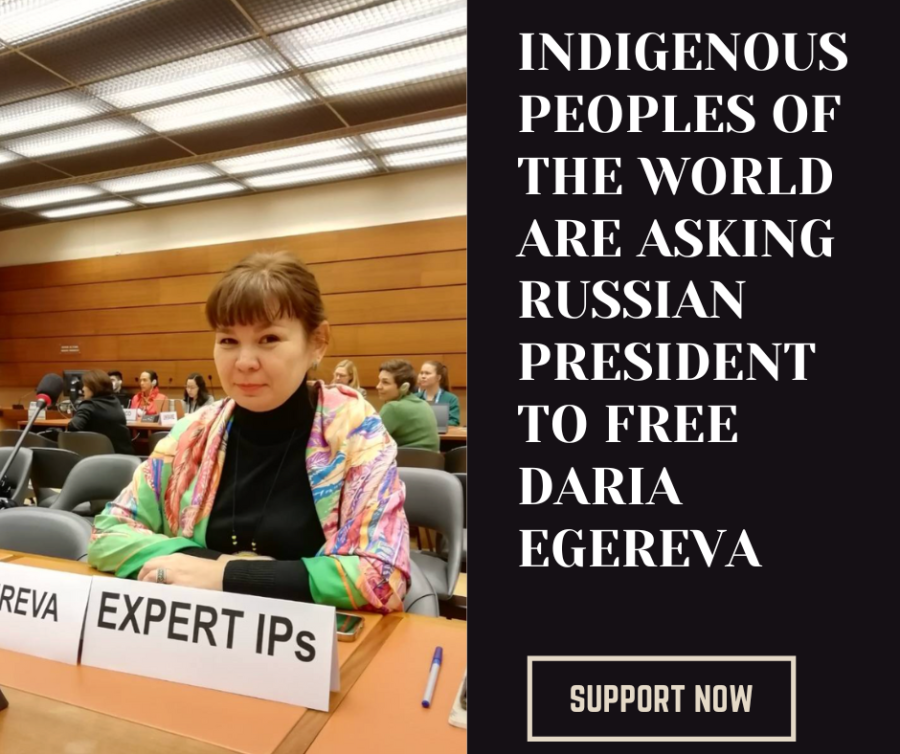
In June 2019, Dmitry Berezhkov and Pavel Sulyandziga authored a report titled, “Acts of intimidation, criminalization and other types of activities with the aim to prevent human rights work of Indigenous activists in Russia.” Berezhkov is the director at Arctic Consult, a database of documentation that Indigenous Peoples have compiled about their rights on land, resources, and self-determination. Sulyandziga is the chair of the board at the International Fund for the Development of Indigenous Peoples in Russia “Batani.” The report highlights how the Russian government has been preventing the work of Indigenous human rights activists in Russia.
Indigenous Peoples live on a vast range of territories in Russia, although the word “Indigenous” does not exist in Russian law without a numerical descriptor. “Indigenous small-numbered peoples of the North, Siberia and the Far East of the Russian Federation” refers to over forty Indigenous Peoples with a population of less than 50,000 each. Indigenous Peoples in Russia occupy a large amount of land due to their nomadic lifestyle. They are among the poorest groups in the Russian population. They do, however, occupy regions that are rich in natural resources, and so they have had to contend with the State for their right to maintain control over these lands.
The Russian State has developed systemic methods to prevent Indigenous human rights activists from carrying out their work, including smear campaigns, personal intimidation, and inhibiting activists from crossing the Russian border.
The authors of the report gathered the information from open sources, mass-media and internal information exchange from the independent, non-formal and officially non-registered network “ABGN”, which unites Indigenous experts and activists around Russia with the aim to protect indigenous peoples rights on lands, resources, and self-determination.
“Lach” is an ethno-ecological information center that was created in 2001 to spread information about Indigenous People’s rights in the Kamchatka peninsula in Russia. In 2008, anonymous writers began to publish articles accusing the “Lach” center of being in “conflict with interests of the Russian Federation” by preventing extractive industries from developing, spreading negative information about the regional government, and sending human rights reports to the UN.
Because of this smear campaign, “Lach” lost two of its primary funders, Danish Environmental Protection Agency (DEPA) and Pacific Environment (PERC -- US), which had to close their activities in Russia. PERC was added to the list of “unwanted organizations” in the Russian Federation, and the “Lach” center had to fire all staff members and cease most of its activities.
Since 2010, the oil company OJSC Surgutneftegas has been working near the “Imlor” Lake in northwest Russian Siberia, where the Khanty Indigenous People have historically lived. Most of the Khanty people have moved out of the area since then, due to pressure from the oil company and pollution, but one person, shaman Sergey Kechimov, still lives there. He has been protesting the pollution caused by this oil company, but law enforcement has been pushing back against him. For example, in 2015 the oil company accused Kechimov of threatening to kill oil workers. He denied these charges, but despite this and his poor understanding of Russian, he was still convicted and sentenced to 30 hours of community service.
In recent years, articles have been published online criticizing Sami activists in Russia for their connection with those in Scandinavia, and their partnerships with Scandinavian NGOs. The articles claim that the development of Sami self-governance in Russia is a threat to Russian state integrity because it promotes separatism.
In 2014, six Sami activists were prevented from leaving the country in order to attend the first World Conference on Indigenous Peoples. Some of their passports were intentionally torn by border patrol officers. Others were beaten by unknown perpetrators. Two missed their flight to New York because they couldn’t drive to the airport because their car’s tires were slashed. They then took a taxi to the airport, but the taxi was pulled over three times and the police checked the activists’ documents. According to the police, a car similar to their taxi was wanted by the authorities. As a result of these events, the activists missed their flight to New York.
Another case is that of Ivan Moseev (Pomor). The Pomor people are descendants of the Russian people that migrated into Northern Russian many ages ago and intermarried with the Indigenous Tribes there. They are not recognized as Indigenous by the Russian government, but they have been fighting to be recognized as such. Ivan Moseev was a chair of the Association of Pomor people in the Archangelsk region, and he and other supporters were organizing the Pomor people to fight for self-governance, including organizing several Congresses of the Pomor people. However, the Russian Federal Security Service (FSB) considered these actions separatism, and took Moseev to court for treason. While the FSB did not prove high treason in court, Moseev was fined, and he was put on the Russian state list of separatists and terrorists.
The Centre for the Support of Indigenous Peoples of the North (CSIPN/RITC) is one of the most prominent indigenous human rights organizations in Russia. Representatives of the Centre and the chair, Rodion Sulyandziga, have had their rights violated concerning their political activities. Sulyandziga was one of the six activists who were unable to cross the Russian border to attend the World Conference on Indigenous Peoples.
In 2015, CSIPN/RITC and two other Indigenous organizations were added to the Russian authorities’ List of Foreign Agents. While the list is meant to just refer to NGOs that receive foreign funding and influence political life in Russia, experts have noticed that the State uses this list to repress independent activity that is poorly connected to political life.
Gennady Schukin is another Indigenous activist who has experienced repression by the Russian State. Schukin recently focused his efforts on fighting for the self-governance of the Taimyr region and for the rights of Indigenous hunters. In 2017 he was convicted of organizing illegal hunting of wild reindeers and so he was unable to participate in the Taimyr regional election campaign. Schukin declared that the sentence was illegal, and went to the Russian Constitutional Court. The Court confirmed that Schukin was correct and ordered a reconsideration of the criminal case on illegal hunting.
The Kemerovo Oblast region is one of the main coal mining areas in Russia. The Shor People live in villages in the southern part of the region, and Shor activists have been protesting the coal mining, which keeps moving further south. A smear campaign was launched against the Shor activists, and after several street protests, the police told Yana Tannagasheva, a leader of the Shor community, that she was criminally responsible for organizing the actions. She was also fired from her position as a teacher and received threats from the police regarding her activism.
Indigenous representatives have also experienced smear campaigns or pressure from authorities before or after their engagement with one of the UN events regarding human rights. There are numerous cases of the Russian Federation intimidating and taking criminal action against Indigenous rights activists, including against the authors of this report, Dmitry Berezhkov and Pavel Sulyandziga.
Dmitry Berezhkov is an Indigenous human rights activist that got started in 2001 at the “Lach” Information center in the Kamchatka peninsula. He eventually became the Vice President of the Russian Association of Indigenous Peoples of the North (Raipon) in Moscow. In 2004, he began negotiating with local FSB officers about the violations of Indigenous peoples’ rights to fish in Kamchatka. In 2010, an FSB officer asked him to write a false report that Raipon was engaging in activities that were anti-state, and Berezhkov refused. In 2011 he was interrogated by the police about Raipon’s activities, and he was told by his friend in the FSB that he would have problems with the FSB if he did not cooperate with them, and so Berezhkov moved out of Moscow for security reasons.
He moved to Norway to continue his activism, but there he was arrested by Norwegian police in 2013 just after a meeting for the World Conference on Indigenous Peoples. This happened per request from the Russian General Prosecutor’s office, which blamed Berezhkov for fraud. However, after two court sessions in Norway, the request from Russia was confirmed politically motivated, and so Berezhkov has been able to receive political asylum in Russia so he can continue his work.
Pavel Sulyandziga has been one of the leaders of the Russian Indigenous human rights movement since the late 1980s. He was one of the Udege leaders that protected their territories from logging companies. From 1997 to 2010 he was the first Vice President of Raipon in Moscow. In Russia, he was also a Chair of the Board of the International Foundation for the Development of Indigenous Peoples “Batani.” Since 2010, Russian authorities have developed smear campaigns against Sulyandziga and used intimidation to try to prevent his activities. In a confidential analytical report of the Presidential Administration in 2012, Sulyandziga was described as a “poorly controlled person, who negatively comments on the situation of Indigenous Peoples’ rights in Russia at international forums.” Also in 2012, when Sulyandziga announced that he would run for President of Raipon, and in the next year the Russian Ministry of Justice attempted to shut Raipon down.
In 2015, Russian law recognized the Batani foundation, which Sulyandziga chaired, as a “foreign agent,” and in 2017 the foundation was liquidated by the Russian Ministry of Justice. Pavel moved to the U.S. with his family and applied for political asylum, but continues to be labelled as a “foreign agent” by Russian representatives.
There are numerous similarities across the experiences of Russian Indigenous human rights activists. Many are the victims of smear campaigns that attempt to paint these activists as working with Western nations against the interests of the state or promoting separatism. One especially noteworthy example is the case when six activists from four different regions were stopped in some way by Russian authorities when they were on their way to the World Conference on Indigenous Peoples. Indigenous activists often experience difficulties with authorities when crossing the border into or out of Russia. The activities Russian authorities are engaging in is not a random coincidence, but a coordinated effort to prevent the work of Indigenous human rights activists.
Photo by Vladimir.



